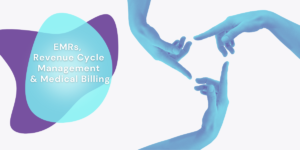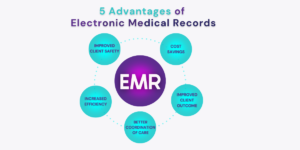Blog

Table of Contents
Electronic medical records (EMRs) are digital versions of client medical records in the healthcare industry. They contain a client’s medical history, diagnoses, medications, lab results, and other relevant medical information.
Benefits of Electronic Medical Records
EMRs provide several benefits over traditional paper-based records. They are more secure and less prone to errors, as they can be backed up and stored in multiple locations. Electronic medical records also allow healthcare providers to easily access clients’ information from anywhere, improving the quality of care and reducing the risk of duplicate tests or procedures. In addition, EMRs can help streamline administrative tasks such as billing and scheduling.
Are There Challenges With EMRs?
Like most new technology, there are a few challenges associated with implementing EMRs. One major concern is the potential for data breaches and unauthorized access to client or patient information if you don’t have an effective security system. Additionally, EMRs can have a learning curve for healthcare providers used to paper-based records.
While there are some challenges associated with implementing electronic medical records, they are easily solvable, and the benefits of using them generally outweigh the drawbacks. As technology advances, EMRs will become an increasingly important tool for healthcare providers to improve client care and outcomes.
EMRs Vs. EHRs
The main difference between EMRs (Electronic Medical Records) and EHRs (Electronic Health Records) is the scope of their data and usage.
- EMRs are digital versions of paper charts containing a client’s medical and treatment history in one healthcare practice.
- On the other hand, EHRs are more comprehensive and are designed to be shared across multiple healthcare organizations.
EMRs, Revenue Cycle Management, & Medical Billing
EMRs are closely associated with revenue cycle management (RCM) and medical billing because they contain all the necessary data and documentation to accurately bill and code for medical services. Here are a few ways that EMRs impact RCM and medical billing:

- Accurate coding and billing: EMRs allow healthcare providers to document client encounters electronically, which can help ensure that all necessary information is captured for accurate coding and billing. This can improve revenue cycle management by reducing the likelihood of errors or omissions in billing.
- Automated charge capture: Many EMR systems have features that allow for automated charge capture. This means that service charges are automatically captured and entered into the billing system, saving time and reducing the risk of errors associated with manual data entry.
- Improved claims processing: EMRs can help to improve the speed and accuracy of claims processing. By ensuring that all necessary information is captured and documented, EMRs can help to reduce the likelihood of claims denials or delays in payment.
- More efficient billing workflows: EMRs can help to streamline billing workflows by allowing healthcare providers to submit claims electronically, track claim status, and receive payments electronically.
Advantages of Electronic Medical Records
There are various advantages to using electronic medical records in the healthcare industry.

- Improved client safety: EMRs help to reduce medical errors and improve client safety. They provide real-time access to client data, such as medication lists and allergies, which helps to reduce the risk of prescribing errors and other mistakes.
- Increased efficiency: EMRs can improve workflow efficiency by automating tasks such as order entry, result retrieval, and appointment scheduling. This can reduce administrative burdens on healthcare providers and free up more time for client care.
- Better coordination of care: EMRs facilitate better coordination of care among healthcare providers, as they can share client information easily and securely. This can help reduce duplicate testing, improve communication between providers, and ensure patients receive appropriate and timely care.
- Improved client outcomes: EMRs provide access to real-time client data and clinical decision support tools. This can help providers to make more informed treatment decisions and improve client outcomes.
- Cost savings: EMRs can help to reduce costs associated with paper-based records, such as storage, printing, and transcription. They can also help reduce the cost of medical errors and unnecessary testing, saving healthcare systems money over time.
Hansei Solutions & Electronic Medical Records
Hansei Solutions can help build your business by taking electronic medical records, revenue cycle management, and data management to the next level. We combine innovative technology with our personal touch for long-term strategic partnerships and effective business solutions. Visit our website or contact us to learn more about our services, solutions, and how we can help grow your business.

Ready to focus on providing healthcare? Let us lighten your load.
We’re here to address your pain points and create growth opportunities for your organization. We’re passionate about what we do, and it shows in every interaction. Learn what makes us tick and schedule a demo today.